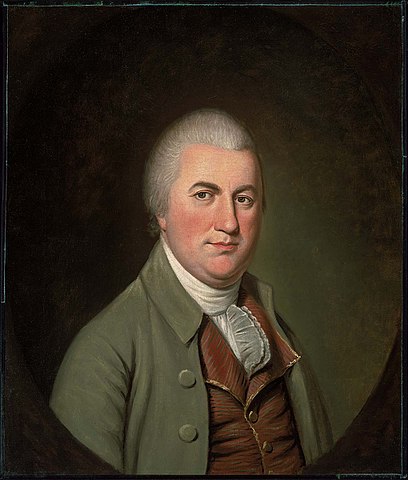
Nathaniel Gorham represented Massachusetts in the Continental Congress. He also represented the state at the Constitutional Convention, serving as the Chairman of the Committee of the Whole.
Early Life
Nathaniel Gorham was born on May 27, 1738. He received minimal education as a child. At the age of 15, he served as an apprentice to a New London, Connecticut, merchant. He returned to Massachusetts before completing his apprenticeship and went on to launch a successful business. In 1763, he married Rebecca Call, with whom he had nine children.
Revolutionary War
Gorham entered public office as a notary. In 1771, he was elected to the Massachusetts legislature, serving until 1775. During the American Revolution, Gorham served as a member of Massachusetts’s Board of War, playing a key role in the organization of the state’s militia.
In 1779, Gorham served as a delegate to the Massachusetts constitutional convention. He was also delegate to the Congress of the Confederation from 1782 to 1783, and again from 1785 to 1787. From June 1786 until January 1787, he served as President of the Confederation Congress. In 1785, Gorham was appointed as judge of the Middlesex County Court of Common Pleas, despite the lack of any legal training.
Constitutional Convention
Gorham represented Massachusetts at the Constitutional Convention and missed only one day of the entire proceedings. During the early days of the convention, Gorham served as Chairman of the Committee of the Whole. He later also served on the Committee of Detail, which drafted the text of the Constitution.
Gorham was a frequent speaker during the Convention, favoring a strong central government that could facilitate interstate commerce and international trade. He also advocated long terms for the President and legislatures, believing it would bring stability to the new government. According to fellow delegate William Pierce, “Mr. Gorham is … high in reputation, and much in the esteem of his countrymen, he is eloquent and easy in public debate, but has nothing fashionable or eloquent in his style.”
After the convention ended, Gorham returned home and participated in the hard fight for ratification in Massachusetts. He also continued to serve on the Massachusetts court of common pleas. Gorham also briefly served on the Governor’s Council from 1788-1789. He never served in the new federal government. In his later years, Gorham and his business partner, Oliver Phelps, lost significant money in a failed land deal involving six million acres of unimproved land in western New York. Gorham died on June 11, 1796, in Charlestown, Massachusetts.







